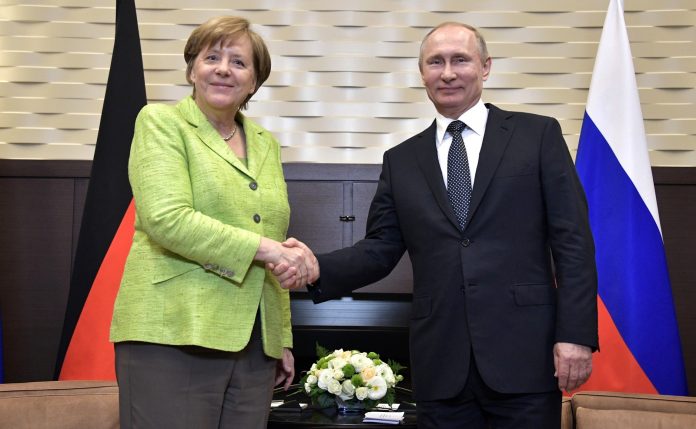Russian President Vladimir Putin will meet Germany’s Chancellor Angela Merkel at Schloss Meseberg on Saturday 18 August. Speaking ahead of the meeting, European Green Party co-chairs Reinhard Bütikofer and Monica Frassoni said:
“As German Chancellor Merkel and Russian President Putin are about to meet for a bilateral summit at Schloss Meseberg, political and business leaders from around Europe are looking at their agenda with widely divergent expectations. One case in point is the Nord Stream 2 pipeline project that Russia’s Gazprom has begun building in the Baltic Sea.
“The majority of EU member countries, a majority in the European Parliament, and the European Commission all oppose this pipeline project for a plentitude of reasons. The German government has so far preferred to largely ignore the criticism, pretending this was an exclusively economic undertaking. The fact, however, that Nord Stream 2 has now officially become an agenda item for the Meseberg summit, does tear apart this web of fiction. Nord Stream 2 was extremely political from the very beginning. The very substance of the political controversy over Nord Stream 2 goes to the core of the central strategic question for the European Union with regard to its future external relations. Will European member states “hang together” and act in solidarity in relation to the rest of the world, or will they “hang separately”, each and every one weakened by a lack of coherence?
“Some commentators say that Nord Stream 2 has become a battle of wills between Washington DC and Berlin about who gets their way in light of the fact that President Trump has come to oppose this project also. But that is not true. It is rather a battle about the strength and clarity of Germany’s European inclination. Vis-à-vis Washington, EU Commission President Juncker‘s visit in July proved that the Union can act effectively if it sticks together. Will the Chancellor apply the same approach to Germany’s Russia relations? If so, the German government must refrain from allowing Russia to pursue its divisive energy policy in Europe by holding on to the Nord Stream 2 project against majority opposition in the EU. And any deal that persists on building Nord Stream 2 while just adding a little Russian fig leaf would constitute German unilateralism in the face of the need for European solidarity just the same.
“Merkel has manoeuvred herself into a difficult spot with regard to Nord Stream 2. If she now wants to move in the right direction, the first step could be the announcement that the German government will stop blocking the necessary reform of the EU’s gas directive. That should send the right signal to Moscow and to Washington.”

